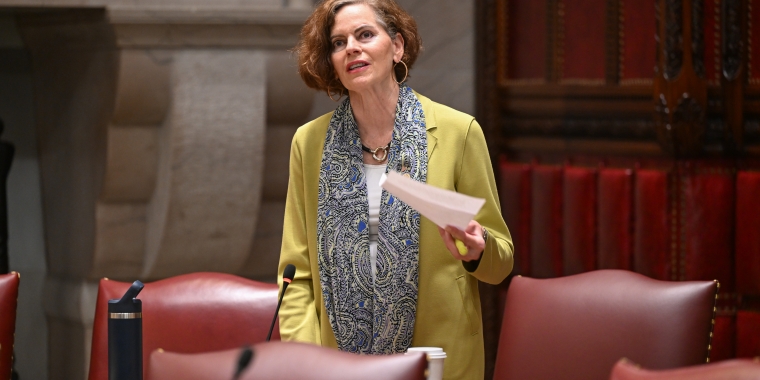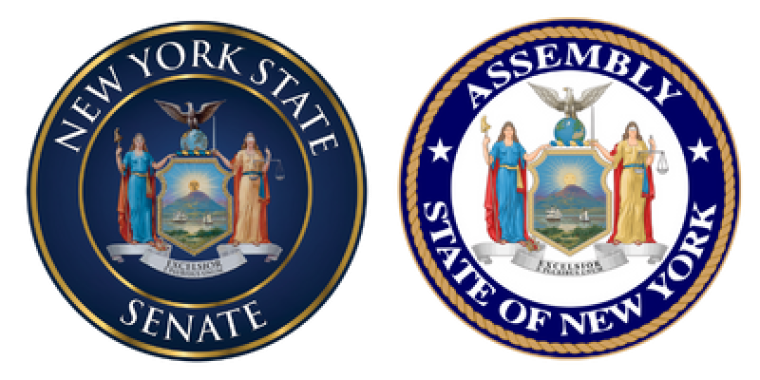
Sen. Fahy’s Statement on Passage of Final SFY2025-6 Budget
May 9, 2025
-
ISSUE:
- 2025-2026 State Budget

“Although this year’s state budget was over a month late, like all budgets, it is the result of numerous compromises—especially as proposed federal cuts remain the largest elephant in the room. First, I’m incredibly proud that the core of our Capital Region and the 46th District, downtown Albany, will receive $400 million in transformative, once-in-a-generation funding. This includes $200 million for downtown revitalization, $150 million for upgrading the New York State Museum, $35 million for the next phase of the reimagining I-787 study, and $1.5 million for addressing public safety in our neighborhoods. I look forward to engaging our community, stakeholders, and residents as we move forward with this funding, and make no mistake: together, these initiatives will usher in a new day for the Capital Region, the impacts of which will be felt for years, if not generations, to come if we get it right.
New Yorkers and Capital Region residents, however, continue to struggle with a worsening affordability crisis, the largest tax increase in American history in the form of looming tariffs, a volatile stock market, and a housing crisis that shows few signs of abating. That’s why I’m proud that this budget invests in several programs and initiatives that will help families and workers make ends meet, including:
- Universal free school meals for all P-12 students;
- Full elimination of the Unemployment Insurance (UI) surcharge for small businesses;
- Free community college for non-traditional students;
- Housing voucher assistance for low and middle-income tenants;
- $200 million to fund new childcare programs and centers; and
- A new $50 million fund to build out affordable housing in Upstate New York.
Additionally, we adopted measures to limit institutional investors from purchasing one- and two-family homes, increasing homeownership opportunities. We must, however, incentivize the build-out of more housing units, improve access to first-time homebuyer programs for aspiring homeowners, and do more to comprehensively address the cost and availability of housing.
As the new Chair of the Senate Disabilities Committee, I’m worried that we’re continuing a pattern of decades-long disinvestment by omitting wage increases for Direct Support Professionals (DSPs). Our human services and homecare workforce is in crisis—many providers continue to experience extremely high turnover primarily due to low and stagnant wages, and the industry’s employment vacancy rate stands at approximately 20%. While a 2.6% increase falls short, I’m committed to meaningfully investing in living wages for these essential workers. Despite this, I am pleased to see the expansion and extension of the Workers with Disabilities Tax Credit, raising it to $5,000 and extending it through 2028. I’m also pleased that we’re increasing our commitment to funding the state’s share of Medicaid funding, as the Trump administration proposes billions of dollars in cuts that will harm the most vulnerable and New Yorkers living with disabilities disproportionately.
When it comes to public safety, it’s vital that New Yorkers feel safe on our streets. That’s why I supported tightening up our state’s discovery law to ensure domestic violence and other serious crimes are not dismissed arbitrarily or on technicalities. I also pushed for changes to our involuntary commitment standards that will allow struggling individuals in our communities to receive the critical medical and mental healthcare they need. I’m also encouraged by the first-ever investment in the creation of community-based, peer-led local behavior health crisis response teams as part of a Daniel’s Law pilot program to help connect individuals who are experiencing a mental health crisis with concerted and tailored support and services.
Locally, I’m proud that our efforts to secure a fair, 25-year retirement plan for Department of Military and Naval Affairs (DMNA) firefighters at the Stratton Air National Guard Base in our district were successful and will finally mean that their benefits reflect those of other firefighters across the state. Furthermore, SUNY police officers, Forest Rangers, and environmental conservation officers will also finally receive a statutory 20-year retirement plan, putting them on par with other law enforcement officers across the state, which will assist with recruitment and retention. To help our towns, villages, and cities keep costs low for taxpayers and residents, the first increase in Aid to Municipality funding in more than a decade was continued this year.
We’re also expanding critical investments in the CHIPS program with an additional $100 million over the originally proposed $1 billion, which helps maintain our communities’ roads and transportation infrastructure.
As the federal government proposes eliminating the U.S. Department of Education and cutting vital funding to school districts, New York is investing a record amount of funding in our P-12 public school system and student and teacher success with a record over $26 billion in foundation aid. I’m proud to support a bell-to-bell cell phone ban in schools that will allow teachers to teach and students to learn, with necessary exceptions. To strengthen Capital Region BOCES and the critical CTE and apprenticeship opportunities and education that they provide, for the first time in more than 30 years, we’re raising the salary reimbursement cap to allow districts to hire more qualified teachers and meet increased student demand. Giving school districts more time and flexibility to meet EV school bus mandates and work with the state to meet these goals will ensure that taxpayers aren’t shouldering the burden of a clean energy transition alone when it comes to clean transportation and air for students.
When it comes to higher education, as the former Chair of the Higher Education Committee in the Assembly, a true standout in this budget is the free community college program–the NY Opportunity Promise Scholarship Program–for 25-55 year olds in high-demand careers, while continuing previous progress by increasing funding for SUNY and CUNY funding to keep our colleges and universities competitive. I’m also pleased to see a much-needed increase in community college operating aid, ensuring that we’re opening the doors to higher education for more and more people in our Capital Region and state.
When it comes to addressing the transcendent threat of our time, climate change, I’m pleased that we are helping ratepayers and homeowners afford the rising cost of energy through an energy affordability program and assistance to acquire clean technology to retrofit homes. A multi-million dollar investment will ensure that we’re replacing lead pipes and delivering clean, contaminant-free drinking water to every household in the Capital Region. We’re investing the most ever in our Environmental Protection Fund (EPF), with an additional $5 million to be used locally, helping upgrade the Albany Pine Bush’s Discovery Center to improve access to the Pine Bush and an ecologically rare region.
Despite these investments, I remain deeply troubled that we are once again failing to adequately leverage the largest public investment in our Capital Region in decades—the $1.7 billion Wadsworth project at the Harriman State Office Campus, to build housing and reserve commercial or retail space on at least 7 acres of the 27-acre project site under legislation (S.1613) I’ve proposed. We cannot continue to double down on the 1960s and miss this opportunity to build more housing and connect our surrounding neighborhoods with a redeveloped and walkable Harriman Campus, rather than continuing it in perpetuity as Albany’s Uptown Parking Lot District.
Finally, there are dire infrastructure and facility needs at St. Mary’s Hospital in my district. While this funding did not make it into the final budget, I remain committed to ensuring that our hospitals serving rural areas aren’t left behind.
As the threat of massive federal cuts, looming tariffs, and fears driving a volatile stock market continue to grow, New Yorkers, their pocketbooks, and their families will be the ones hit the hardest. Despite some key omissions, I’m pleased that this budget delivers some targeted relief for Capital Region residents, and I commend Senate Majority Leader Andrea Stewart-Cousins and my legislative colleagues for crafting an overdue, but balanced fiscal plan amidst a number of fiscal challenges facing our state and nation.”
###
Share this Article or Press Release
Newsroom
Go to Newsroom


